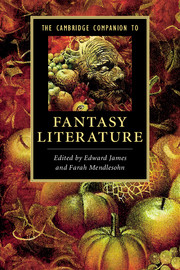5 - Tolkien, Lewis and the explosion of genre fantasy
from PART I - HISTORIES
Published online by Cambridge University Press: 28 March 2012
Summary
J. R. R. Tolkien said that the phrase ‘In a hole in the ground there lived a hobbit’ came to his unconscious mind while marking examination papers; he wrote it on a blank page in an answer book. From that short sentence, one might claim, much of the modern fantasy genre emerged. Tolkien's The Lord of the Rings (1954–5) (henceforth LOTR) looms over all the fantasy written in English – and in many other languages – since its publication; most subsequent writers of fantasy are either imitating him or else desperately trying to escape his influence. His hold over readers has been extraordinary: as is well known, and to the annoyance of literary critics, three major surveys of public opinion in Great Britain around the turn of the millennium placed him as the ‘author of the century’ or his book as the most popular work of English fiction, beating Jane Austen's Pride and Prejudice into second place. In 2004, Australians and Germans both voted LOTR their nation's favourite book. LOTR has been translated into all the world's major languages; and film director Peter Jackson's loving re-creation of Tolkien's world (2001–3) is the most profitable trilogy in cinema history, grossing nearly three billion American dollars.
The fantasy novels of C. S. Lewis – in particular his so-called ‘Space Trilogy’ (1938–46) and the seven Narnia books (1950–56) – have not had quite that impact, but have nevertheless reached a large audience, and, as Lewis's status as a Christian writer continues to grow, so that audience expands. The Narnia sequence has become one of the best loved and most enduring series of fantasies for children, currently reaching a wide cinema audience: the first three adaptations were released in 2005, 2008 and 2010, and the fourth is in planning: it is The Magician’s Nephew, based on the sixth book which Lewis published.
- Type
- Chapter
- Information
- The Cambridge Companion to Fantasy Literature , pp. 62 - 78Publisher: Cambridge University PressPrint publication year: 2012
- 6
- Cited by

